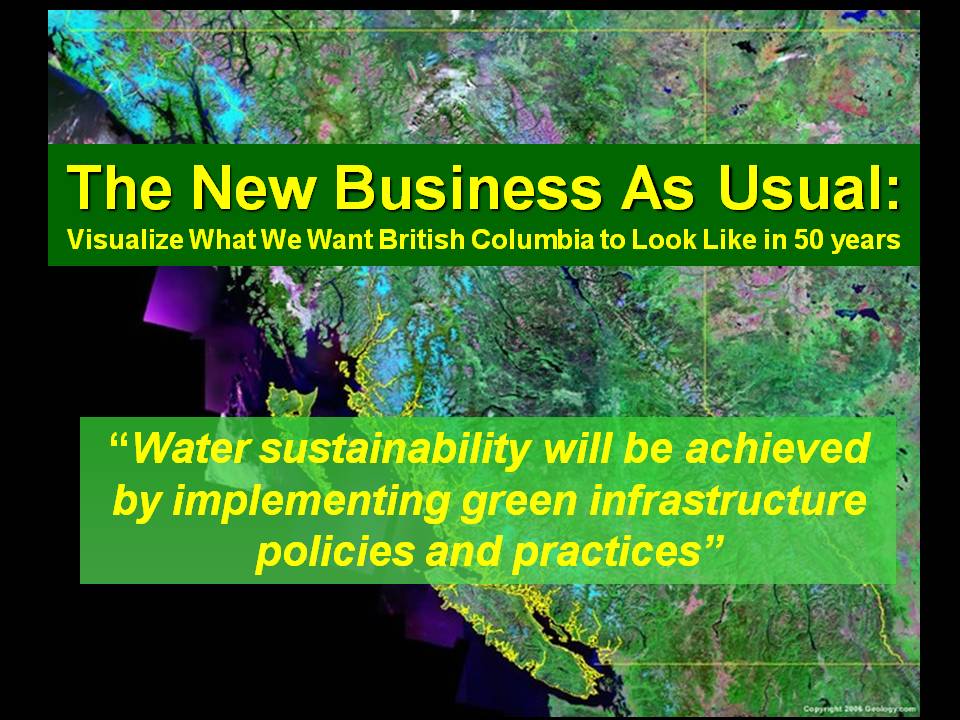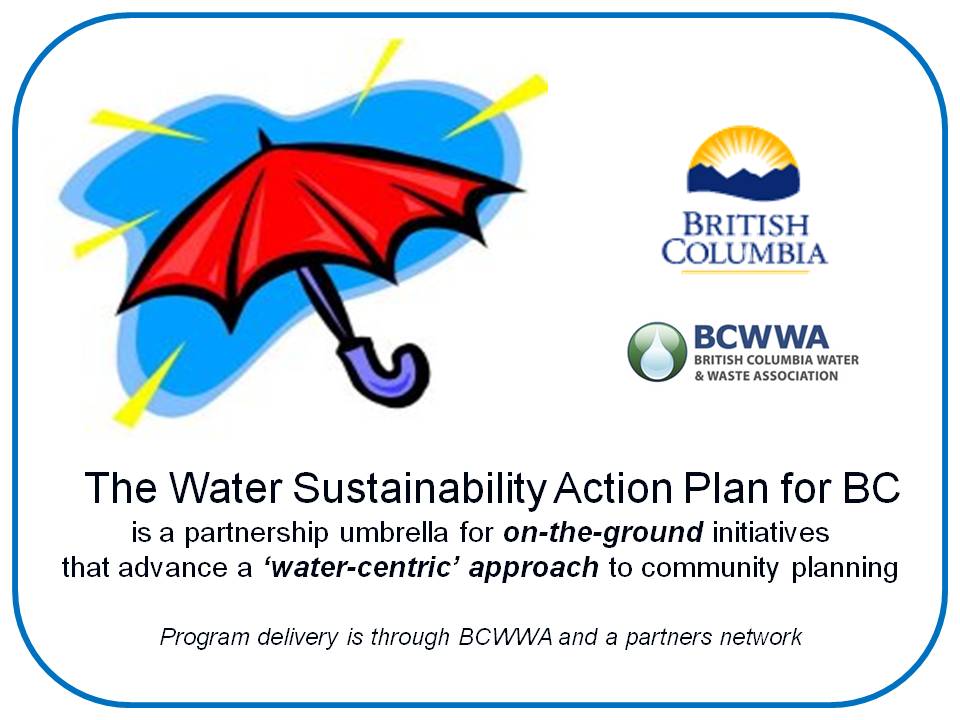2009 Resilient Cities Conference includes a module on the Water Sustainability Action Plan for British Columbia
SECOND ANNOUNCEMENT FOR…..
Getting Ahead of the Wave: Convening for Action in British Columbia to Achieve Water Sustainability by Implementing Green Infrastructure
Note to Reader:
To download a report-style, PDF version of the following web story about the role of the BC Water & Waste Association at the 2009 Resilient Cities Conference on October 21, click on Water Bucket Story about Water Sustainability Action Plan Module at Resilient Cities
Urban Strategies for Transition Times
Sustainability imperatives, the call for climate action, and the pressure for new approaches in almost every urban system have North American cities scrambling to manage the shift toward ecological practices and greater resilience.
To provide solutions to these challenges, three organizations – the Center for Urban Innovation, Smart Growth BC,and the Canadian Society of Ecological Economics (CANSEE) – have combined forces to co-host Resilient Cities: Urban Strategies for Transition Times from October 20th through 22nd in Vancouver. This is the sixth in the Gaining Ground Summit Series. The Water Sustainability Committee of the BC Water & Waste Association (BCWWA) is a conference partner.

Showcasing a “Made in BC” Approach
“This unique two-and-a-half day gathering addresses the transformational challenges that all North American cities, whether large or small, urban or rural, are facing in sustainability, economy and urban management”, states Glen Brown, Chair of the BCWWA Water Sustainability Committee. “The CANSEE component includes a  module that will showcase the Water Sustainability Action Plan for British Columbia, a partnership delivery vehicle for the Province’s Living Water Smart and Green Communities Project.”
module that will showcase the Water Sustainability Action Plan for British Columbia, a partnership delivery vehicle for the Province’s Living Water Smart and Green Communities Project.”
“Released in 2004, the Water Sustainability Action Plan for British Columbia is a partnership umbrella for an array of on-the-ground initiatives that promote a ‘water-centric’ approach to community planning and development. The Action Plan comprises inter-connected program elements that give local governments and practitioners the tools and experience to better manage land and water resources.”
Bridge from Theory to Practice
 “There is growing national and international interest in how we have moved from theory to practice in implementing green infrastructure. Convening for Action on Vancouver Island – better known by the acronym CAVI – is a notable success story that demonstrates what can be accomplished through partnerships, collaboration, innovation and integration,” continues Eric Bonham, BCWWA Vancouver Island Liaison and member of the CAVI Leadership Team. “Our module is titled Getting Ahead of the Wave: Convening for Action in British Columbia to Achieve Settlement in Balance with Ecology.”
“There is growing national and international interest in how we have moved from theory to practice in implementing green infrastructure. Convening for Action on Vancouver Island – better known by the acronym CAVI – is a notable success story that demonstrates what can be accomplished through partnerships, collaboration, innovation and integration,” continues Eric Bonham, BCWWA Vancouver Island Liaison and member of the CAVI Leadership Team. “Our module is titled Getting Ahead of the Wave: Convening for Action in British Columbia to Achieve Settlement in Balance with Ecology.”
 In June, The Future of Canada’s Infrastructure 2009 was held in Toronto, Ontario. Kim Stephens, Program Coordinator was invited to tell the story of the Water Sustainability Action Plan. “This event provided a timely opportunity to reflect on what we have achieved in BC since 2004, and identify universal principles that should be applicable anywhere,” he says.
In June, The Future of Canada’s Infrastructure 2009 was held in Toronto, Ontario. Kim Stephens, Program Coordinator was invited to tell the story of the Water Sustainability Action Plan. “This event provided a timely opportunity to reflect on what we have achieved in BC since 2004, and identify universal principles that should be applicable anywhere,” he says.
To Learn More:
To download a PDF copy of the ‘story of the Action Plan’, click on Pathway to Water Sustainability in British Columbia: Partnerships, Collaboration, Innovation and Integration.
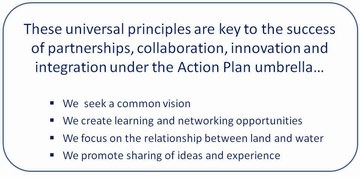
Communication – Telling the BC Story
“In addition to telling the CAVI story, the BCWWA module will feature provincial tools that have been developed through partnerships. These tools facilitate doing business differently and preparing communities for change,” adds Mike Tanner, Chair of the Waterbucket Website Partnership.
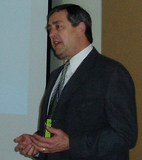 “Launched in 2005, the waterbucket.ca website is the key to the communications strategy for the Water Sustainability Action Plan. The website is designed to provide the complete story on integrated land and water management – why, what, where and how.”
“Launched in 2005, the waterbucket.ca website is the key to the communications strategy for the Water Sustainability Action Plan. The website is designed to provide the complete story on integrated land and water management – why, what, where and how.”
“Over the past two years, Vancouver Island has been the Action Plan pilot region for a bottom-up approach to informing and educating municipal planners, engineers and others. The experience gained through this process has demonstrated the valuable role that Water Bucket plays in delivering information and sharing lessons learned.”
“We have found it extremely effective to publish news-style stories that create interest in Action Plan programs and events. Water Bucket stories establish expectations about program curricula and event outcomes. To get the word out, we work with our partners to craft email-type news releases that are complete with embedded links.”
Tools for Living Water Smart
“Tools such as the Water Balance Model, the Water Conservation Calculator, the Landscape Irrigation Scheduling Calculator, the Agriculture Irrigation Scheduling Calculator and the Irrigation Water Demand Model support new approaches to water management, and will facilitate informed decision-making about climate change adaptation,” states Mike Tanner.
 “These tools are helping to bring about fundamental changes in how land is developed and water is used,” notes Ted van der Gulik, Chair of the Inter-Governmental Partnership that developed and maintains the Water Balance Model. “In the end, only what can be measured can be managed. With the tools that we have been developing, communities can now establish the metrics needed to measure critical values.”
“These tools are helping to bring about fundamental changes in how land is developed and water is used,” notes Ted van der Gulik, Chair of the Inter-Governmental Partnership that developed and maintains the Water Balance Model. “In the end, only what can be measured can be managed. With the tools that we have been developing, communities can now establish the metrics needed to measure critical values.”
“The power of the Water Balance Model process, for example, lies in the conversations that result from users generating a single number – that is, the percentage of rainfall that becomes runoff; and that represents the synthesis of each land development scenario. Comparison of scenarios creates understanding, especially when the focus is on the hydrologic implications of the assumptions that underpin those percentages.”
Today’s Expectations are Tomorrow’s Standards
The Province of British Columbia’s Living Water Smart and Green Communities Project provide an over-arching framework for moving British Columbia toward water sustainability by implementing green infrastructure policies and practices.
The ultimate goal is to establish expectations that will, in turn, influence the form and function of the built environment. The desired outcome is to align efforts, build commitment and establish consistent expectations for effecting change on the ground: This is what we want to achieve, and this is how we will get there.
To Learn More:
To gain insight into regulatory and partnership initiatives that are driving changes in accepted practice in British Columbia, click on Influencing Actions on the Ground in British Columbia: Today’s Expectations are Tomorrow’s Standards.
The New Business As Usual:
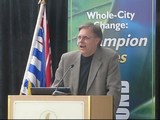 “We are using the slogan The New Business As Usual to convey the message that, for change to really occur, practices that until now have been viewed as the exception must become the norm moving forward. We have to build regulatory models and develop models of practice and expertise to support The New Business As Usual”, stated Dale Wall, Deputy Minister when he announced the launch of both the new Water Balance Model and the Vancouver Island Learning Lunch Seminar Series at the Gaining Ground Summit in May 2008.
“We are using the slogan The New Business As Usual to convey the message that, for change to really occur, practices that until now have been viewed as the exception must become the norm moving forward. We have to build regulatory models and develop models of practice and expertise to support The New Business As Usual”, stated Dale Wall, Deputy Minister when he announced the launch of both the new Water Balance Model and the Vancouver Island Learning Lunch Seminar Series at the Gaining Ground Summit in May 2008.
To Learn More:
The continuous process for improvement is illustrated by the graphic below. To learn more, click on Creating Our Future: Today’s Expectations are Tomorrow’s Standards for Living Water Smart.
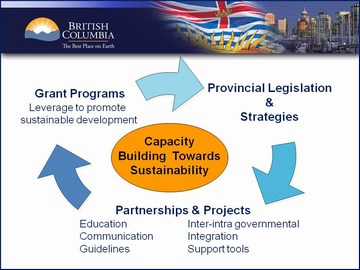
About the Water Sustainability Action Plan
Sponsored by the Province of British Columbia and the Real Estate Foundation of British Columbia, the Action Plan is being delivered through partnerships and regional pilot projects and programs. “Through outreach and education, the guiding vision is to  influence land and water practitioners to learn about and use practices that better balance the necessary relationships of settlement activity and ecological assets in local and regional landscapes,” explains Glen Brown.
influence land and water practitioners to learn about and use practices that better balance the necessary relationships of settlement activity and ecological assets in local and regional landscapes,” explains Glen Brown.
“Under the Action Plan umbrella, the BCWWA Water Sustainability Committee is the managing partner and is responsible for providing leadership, facilitation and organizational services for program delivery. The Water Sustainability Committee is a roundtable of organizations that have a specific interest or mission in implementing the Action Plan.”
“ What we want British Columbia to look like in 50 years and beyond will be a result of collaboration of local communities and regional districts reaching beyond their own jurisdictional boundaries and responsibilities to embrace the ‘bigger picture’ of designing human settlement in harmony with nature,” summarizes Eric Bonham.
What we want British Columbia to look like in 50 years and beyond will be a result of collaboration of local communities and regional districts reaching beyond their own jurisdictional boundaries and responsibilities to embrace the ‘bigger picture’ of designing human settlement in harmony with nature,” summarizes Eric Bonham.


